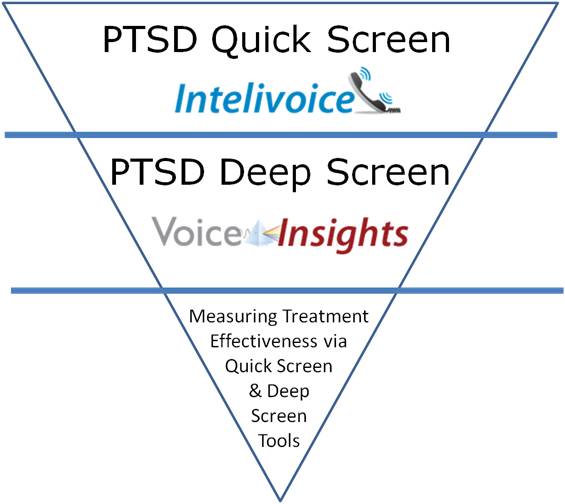Three-Tiered Screening Solution
VoicePrism has created tools to enable Post Traumatic Stress Disorder (PTSD) screening at three levels, from a high-level PTSD Quick Screen, to a comprehensive PTSD Deep Screen, to measurement of ongoing PTSD treatment effectiveness.
A Societal Problem at Crisis Level
The combination of advances in battlefield medicine, which save a much larger percentage of military personnel's lives, and two insurgent wars, has resulted in a severe problem with PTSD. Whether it is American soldiers killing their fellow soldiers, their families or themselves, the horrible effects of PTSD on the people making the biggest sacrifices are readily apparent.
- Nearly 20 percent of military service members who have returned from Iraq and Afghanistan - 300,000 in all are assumed to have PTSD
- PTSD and depression among returning service members will cost the nation as much as $6.2 billion in the two years following deployment - from costs related to direct medical care, lost productivity, and suicide
- Investing in more high-quality treatment could save close to $2 billion within two years by substantially reducing the indirect costs of PTSD
Chairman of the Joint Chief's of Staff, Admiral Mike Mullen, has recommended mandatory screening for all active military personnel. He feels this is the only way to eliminate the stigma surrounding mental health . At least half of all military personnel believe that having PTSD or asking for mental health assistance will adversely affect their career or make them look bad to their peers. Resource constraints, however, make it virtually impossible to perform the massive quantity of screenings required to make this a reality due to geographical challenges and a severe shortage of trained Psychologists.
VoicePrism's PTSD Screening Tools

 View Demo
Tier 2: Flexible survey platform that can incorporate any of the current PTSD self-administered
and clinician-assisted PTSD assessments, with the addition of voice response questions. The military
personnel answer the voice response questions and their statements are analyzed for the presence and
intensity of stress by the voice engine. Military psychologists can use the results as an additional data
point to determine their diagnosis.
View Demo
Tier 2: Flexible survey platform that can incorporate any of the current PTSD self-administered
and clinician-assisted PTSD assessments, with the addition of voice response questions. The military
personnel answer the voice response questions and their statements are analyzed for the presence and
intensity of stress by the voice engine. Military psychologists can use the results as an additional data
point to determine their diagnosis.
 View Demo
Tier 3: It is currently difficult to objectively and consistently measure the effectiveness of
the various treatment modalities for PTSD. VoicePrism's tools can be used to measure people pre and post
treatment to provide objective data on the effectiveness of various treatments.
View Demo
Tier 3: It is currently difficult to objectively and consistently measure the effectiveness of
the various treatment modalities for PTSD. VoicePrism's tools can be used to measure people pre and post
treatment to provide objective data on the effectiveness of various treatments.
 View Demo
View Demo
Important and Far-Reaching Benefits
Initial validation of the technology for stress, anxiety and depression by the Air Force Research Laboratory and a top Japanese University has been completed and final validation of specific tools for PTSD applications is underway. Implementation of VoicePrism's solution could have far-reaching medical, economic, and societal benefits:
- Accomplishing the military's mandatory screening objective
- Consistent, scalable and cost-effective high-level screening for PTSD
- Reduce or even eliminate the stigma associated with PTSD and Mental Health Assistance
- Free-up valuable time for psychologists to spend more time treating and less time screening (a task most loath performing)
- Provide additional objective data for psychologists to utilize
- Provide good jobs for Veterans who could be trained to help administer the initial screening



